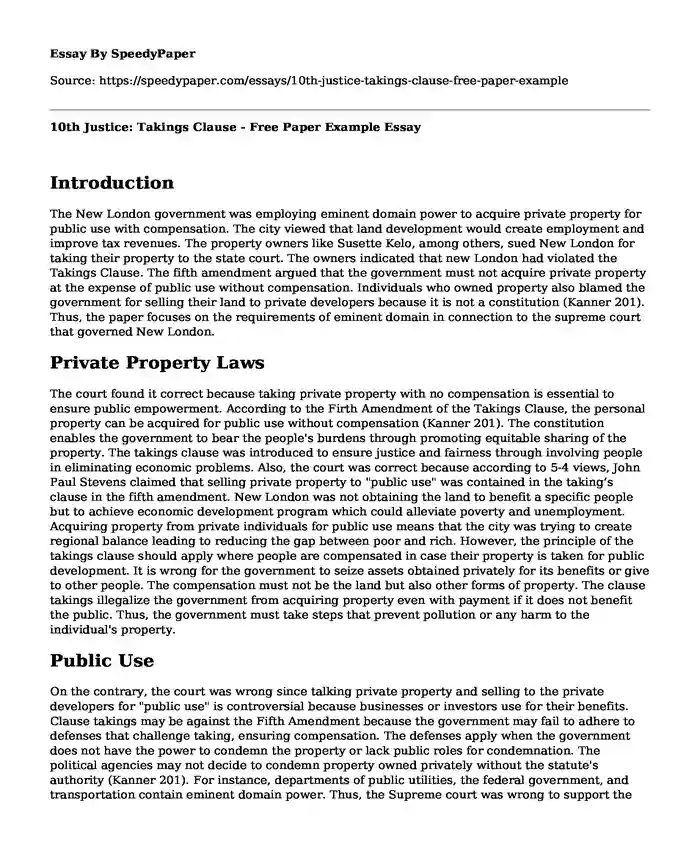
| Type of paper: | Essay |
| Categories: | United States Law Government |
| Pages: | 3 |
| Wordcount: | 636 words |
Introduction
The New London government was employing eminent domain power to acquire private property for public use with compensation. The city viewed that land development would create employment and improve tax revenues. The property owners like Susette Kelo, among others, sued New London for taking their property to the state court. The owners indicated that new London had violated the Takings Clause. The fifth amendment argued that the government must not acquire private property at the expense of public use without compensation. Individuals who owned property also blamed the government for selling their land to private developers because it is not a constitution (Kanner 201). Thus, the paper focuses on the requirements of eminent domain in connection to the supreme court that governed New London.
Private Property Laws
The court found it correct because taking private property with no compensation is essential to ensure public empowerment. According to the Firth Amendment of the Takings Clause, the personal property can be acquired for public use without compensation (Kanner 201). The constitution enables the government to bear the people's burdens through promoting equitable sharing of the property. The takings clause was introduced to ensure justice and fairness through involving people in eliminating economic problems. Also, the court was correct because according to 5-4 views, John Paul Stevens claimed that selling private property to "public use" was contained in the taking’s clause in the fifth amendment. New London was not obtaining the land to benefit a specific people but to achieve economic development program which could alleviate poverty and unemployment. Acquiring property from private individuals for public use means that the city was trying to create regional balance leading to reducing the gap between poor and rich. However, the principle of the takings clause should apply where people are compensated in case their property is taken for public development. It is wrong for the government to seize assets obtained privately for its benefits or give to other people. The compensation must not be the land but also other forms of property. The clause takings illegalize the government from acquiring property even with payment if it does not benefit the public. Thus, the government must take steps that prevent pollution or any harm to the individual's property.
Public Use
On the contrary, the court was wrong since talking private property and selling to the private developers for "public use" is controversial because businesses or investors use for their benefits. Clause takings may be against the Fifth Amendment because the government may fail to adhere to defenses that challenge taking, ensuring compensation. The defenses apply when the government does not have the power to condemn the property or lack public roles for condemnation. The political agencies may not decide to condemn property owned privately without the statute's authority (Kanner 201). For instance, departments of public utilities, the federal government, and transportation contain eminent domain power. Thus, the Supreme court was wrong to support the clause takings because some of the private property acquired for public use is used to enrich business individuals and developers without minding the landowners' welfare. Also, compensation may not supplement the land because it may be expensive or have value, unlike what the government offers.
Conclusion
Hence, if I were the 10th justice, I would change the political leadership and vote the government, which exercises fairness and justice. I would also endorse the political leaders who desire to eliminate problems linked with clause-taking in the constitution to accommodate everyone without discrimination or favoritism. Therefore, the government can support eminent domain and obtain property owned privately at the expense of public use with compensation to ensure economic development through creating employment and reducing poverty.
Work Cited
Kanner, Gideon. "Kelo v. New London: Bad Law, Bad Policy, and Bad Judgment." Urb. Law. Vol.38, 2006, p. 201.
Cite this page
10th Justice: Takings Clause - Free Paper Example. (2023, Nov 24). Retrieved from https://speedypaper.net/essays/10th-justice-takings-clause-free-paper-example
Request Removal
If you are the original author of this essay and no longer wish to have it published on the SpeedyPaper website, please click below to request its removal:
- Essay Sample Describing the Dominant Culture in American society
- Essay Sample on Globalization Research
- Free Essay Sample on School Shootings
- Essay Example on Famous Killer in Canada: Allan Legere
- Paper Example. Rhetorical Analysis of Two Texts
- Charlotte Affordable Housing - Essay Sample
- Paper Sample on Biden's Healthcare Proposal
Popular categories




